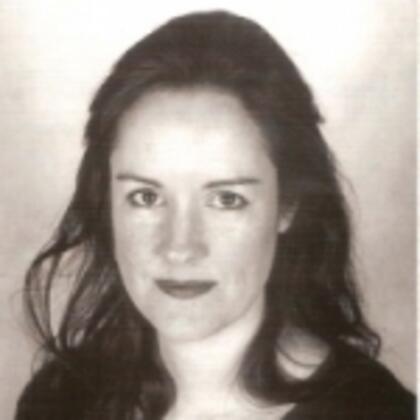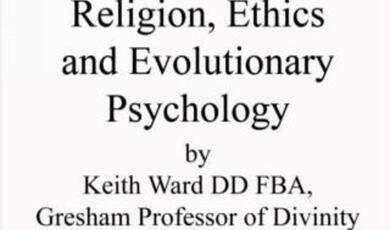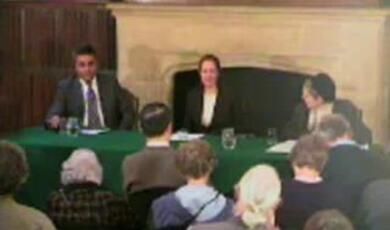The Twosomeness of Life
Share
- Details
- Transcript
- Audio
- Downloads
- Extra Reading
We must move from ‘The Other’ as a theoretical problematic — to an-other human being as the real person who confronts us and is different. The fundamental importance of ‘relationship’ suggests a new model for consideration of these philosophical and theological issues. I will propose that the fundamental category for future reflection not be ‘substance’, ‘being’, ‘person’, or any of the usual theological and philosophical contenders, but ‘relation’.
Download Transcript
The Twosomeness of Life
Professor Gwen Griffith-Dickson
Summary
Last week I spoke about ‘philosophical narcissism’, which had in particular these characteristics: the desire to take oneself as the object of knowledge and philosophical scrutiny; the desire to have oneself represent objectivity; the desire to separate oneself from one’s body; and the desire to be self-sufficient, to lack nothing. Having looked at different accounts of ‘the self’ and ‘the other’, I felt that these both wittingly and unwittingly as it were indicated that our notions of ‘self’ and ‘other’ are by no means as clear and certain as they ought to be, if we are to make use of them as philosophers do. Finally, I suggested that we move beyond philosophical narcissism by ceasing to think in terms of ‘self’ and ‘other’, and think instead about ‘we’.
I also explored the idea that we form notions of our selves in relation to how we form notions of others. And I suggested that these notions may be less than clear and obvious, when we begin to examine them.
Beyond Philosophical Narcisissm
Some thinkers in the West have not been philosophical narcissists, but have advocated a relational approach, rejecting the characteristics I identified (perhaps rather unkindly) as ‘narcissistic’.
The first point on which they concur, and distinguish themselves from their self-reflective colleagues, is their rejection of Descartes’ cogito ergo sum as the foundation for knowledge. Instead, they champion the relationship as the fundamental fact of existence.
‘In the beginning is relation’.1 A human being cannot be viewed in isolation. We are almost made out of our relationships. For the German philosopher Ludwig Feuerbach, even our self-consciousness is the result of a fulfilled relationship. 2 ‘Only in this unity between I and You does one become human. Where there is no You, there is no I’.3 Only be discovering a ‘You’, an intimate other, do we discover a self, an ‘I’. The Jewish philosopher Martin Buber writes, ‘A person makes his appearance by entering into relation with other persons. ... He who takes his stand in relation shares in a reality, that is, in a being that neither merely belongs to him nor merely lies outside him. All reality is an activity in which I share without being able to appropriate for myself. Where there is no sharing there is no reality.’4
Secondly, they tend to be suspicious about objectivity, or at least, what objectivity is and how you get it. They prefer to embrace the personal as a starting-point—but without taking their own selves as their finishing-point. So the usual preference for the objective over the subjective is reversed; the subjective is the starting-point, not to get stuck there but to attain an inter-subjectivity. The Jewish philosopher Franz Rosenzweig writes, ‘I really believe that a philosophy, to be adequate, must rise out of thinking that is done from the personal standpoint of the thinker. To achieve being objective, the thinker must proceed boldly from his own subjective situation.’5
This grows out of the primary place of the relationship, as we see in this assertion from Ebner: ‘No one can have an “objective”, standpointless, and perspectiveless relation to the spiritual in others. The I has no absolute existence, for it exists only in relationship to the Thou. To its objective being-given-in-the-world corresponds the “subjective” perseverance in love; so that the word and love belong together in their spiritual ground. ...’6
To pause for a moment and picture all this in less abstract terms: there is a shift of standpoint that happens when ‘I’ am no longer the only person under consideration. And when the other person is quite different to myself, I find that I am shifted off being the ‘I’ and into being ‘the other’ who is strange and different. I will spell this out more in a moment.
Their third rejection of philosophical narcissism is of bodilessness, idealist philosophy’s rejection of the everyday world and its concerns. Hamann was noteworthy for his time for his relish for the physical. For Hamann, the various striking features of our experience – ourselves, others, language , the world, ultimately God – are all in extricably related; and it is his convic tion that a true and deep understanding of any of these cannot arise without consideration of its relationship to the others. Philosophy of language must include a discussion of God, and a discussion of God must make reference to sexuality and vice versa . Hamann has a particular interest in reclaiming aspects of human experience which were neglected in philosophy , such as sexuality .
So he proposed a different understanding from Descartes’ ‘cogito ergo sum’, ‘I think therefore I am’. (Actually, he proposed two - one is, ‘What Descartes says of his “cogito”, of this the action of my stomach convinces me.’) But in a slightly more serious mood, he wrote in a letter: ‘Not Cogito; ergo sum, but vice versa, and more Hebraic: est; ergo cogito’.7This does not simply reverse the order of being and thinking: Hamann’s suggestion is not ‘sum ergo cogito’. ‘Est, ergo cogito’: it is, therefore I think. It is not solely my existence which is the foundation of thought. What comes first is the world—all that is. Only because it is, can I think. The thinker exists first in a larger context; that of the whole of creation. And as Hamann says, if we proceed on the basis of ‘Est, ergo cogito’, ‘the whole system might receive another language and direction.’8
Hamann’s insistence on the real, the concrete, and on the larger contexts that are reflected in the philosopher’s ‘subjectivity’ was profoundly influential in the German tradition. Ludwig Feuerbach, taking up the baton, stressed that the thinker must reflect on the human person in its concrete existence; indeed, not only think that way, but live that way:
‘Do not wish to be a philosopher as opposed to a person, be nothing other than a thinking person, do not think as a thinker, that is, in some isolated faculty ‘for-itself’, torn out of the totality of real human life, think as a living, real being, think in existence, ... in the world as a member of it, not in the vacuum of abstraction, as a single monad, as an absolute monarch, as a detached, otherworldly God—then you can count on your thoughts being a unity of being and thinking.’9
If these thinkers insist on the importance of relationship, you can anticipate that they emphasise our incompleteness, our need for one another, rather than denying our lack. But this interdependence is not a cause for anxiety, or a sign of immaturity. When Hamann’s friend Herder complained that ‘Gaps and lacks cannot be the character of the human species’, Hamann replied in a letter: ‘Gaps and lacks – is the highest and deepest knowledge of human nature , through which we must climb our way up to the ideal’.10 But for Hamann, this makes us all the more able to enjoy relationships, and feel united to our community.
As we saw last week, Ferdinand Ebner’s so-called ‘deficient modes of being’ are characterised by the denial of the need for the other. This ‘being-for-itself of the I in its solitude’ (!) [Für-sich-sein des Ichs in seiner Einsamkeit] isn’t our original condition, but is a result of the act of pulling away from others. But this withdrawal is only relative and can never completely succeed. It remains true that the grounding reality of a relationship with a You is necessary. So it is always only a relative‘Youlessness’.11 Even when one is closing oneself off, a You is still present — in madness, a fictional You, in poetry or metaphysics, an idealised You, a possible but not actual You.
But such thinking is sin, according to Ebner the Catholic; in closing oneself off from others and pulling back from the dialogue with others, one ‘falls away from God’. He describes it as the original Fall, the first misuse and perverted use of ‘freedom’; our temptation to exist in without God and only in ourselves. But in so doing, we lose not only the other human being who challenges us, but also our own self.12
This ‘Self’ and ‘Other’, which I concede can swiftly become rather abstract, can also be in danger of being restricted to only I and Thou and no-one else. In the thinking of Hamann, however, it is extended to the level of a community. Over time, a community extends itself into a tradition. For example, when Hamann talks about reason and knowledge, he describes them in a two-fold way. We receive traditions from our community, which we appropriate and integrate; and we also conceive our own ideas and insights, which we in turn pass on in contribution to the tradition. The fruits of our reason ‘are therefore in the truest senserevelations and traditions which we take for our own property’, transform, and thus fulfil our vocation, to reveal and to transmit.13 The gaps and lacks in our human nature fit us all the more for the enjoyment of nature through experiences and to enjoy our community through traditions. This account of rationality and knowledge also makes it clear that reason and rationality are impossible without human relationships: people to teach us, people to whom to communicate our own revelations.
And this centrality of relationships is not just a happy and cosy fact of human existence of course: Ebner’s journal entry of June, 1912 reflects: ‘The "I" is an immediate fact experienced of itself. Not so, how ever, the "you". Here is the most dif fi cult problem of ethics: the recognition of the "I" in an oth er, which is pre cisely "you"; the postulation of the "you" as an ethical chal lenge.'14
Three stages
We can see different stages or moments in which this encounter with another person from a different religion or culture shapes and affects us.
Because Christianity grew out of Judaism, Christianity only can understand it itself on the basis of its understanding of Judaism. Whatever stance a Christian takes on the validity of the Jewish revelation will of course have an impact on one’s understanding of Christianity. Christians can only know who Jesus was and who they are on the basis of who they think Jews are. But after its 2,000 year history, Christianity must also understand itself in relation to Judaism in another sense. Christians must also understand who and what they themselves are, based on their treatment of Jews in European Christian countries throughout history. That reveals another story, another facet of Christian culture and behaviour that must be taken into account in their self-examination.
The encounter with another who sees an issue in sharp contrast to yourself can also throw you back onto thinking about your own tradition differently. I had a fascinating discussion with a Muslim scholar on the subject of Jesus Christ. He found Jesus an inspirational figure, and had worked out (largely through Sufi spirituality) a very interesting interpretation of Jesus, even Jesus’ experience on the Cross, which he interpreted in the light of the Sufi idea of ‘annihilation’ of the self in God. But what, as a Muslim, he could not accept was the idea that Jesus’ death in any way brought humanity salvation. And his challenge to it was on the basis of something shared with Christianity: a common understanding of God as powerful, wise, and benevolent. For if Jesus’ death was somehow necessary to save us from damnation, what did that say about the Christian’s concept of God, who is in charge of these matters? Is God not powerful enough to save us by His will that we be saved? Is he not compassionate enough to wish to us to be saved? But if the answer to both these questions is yes, then what need is there of a sacrifice by Jesus? Why should God require it of him? Is it justice to demand the sacrifice of an innocent life in order to have compassion on the guilty? Of if it somehow lies in the nature of things that the debts of sin must be paid off by somebody — isn’t God the author of the nature of things? Is he not empowered to write off that debt rather than demand an unjust blood payment?
I think my friend was justified in thinking he had the Christian in a theological headlock here, one that is difficult to escape from. He certainly made me rethink from an entirely new perspective the question of the relationship between what the Christian wants to say about Jesus and what the Christian wants to say about God.
This experience of looking at yourself in a slightly new light can be superseded by an experience that is still more discomfiting— but also more revealing. That is the moment in which one realises oneself is an ‘Other’, strange and alien, to someone else. There is a historical example of this that I find quite charming. Captain James Cook, in his two ships HMS Resolution and HMS Discovery stumbled on the Hawaiian islands ‘by accident’ — at that time, none of the Europeans knew these islands, their people and their culture even existed.
The British sailors, who found the islands and their hospitable people just in time – they had almost run out of provisions and they were in the middle of the Pacific ocean – enjoyed their hospitality for a considerable length of time. During that time, Lt. King, Cook’s second in command, kept a journal about his experiences. There is an interesting point where we see that he begins to take a Hawaiian ‘Other’ as a man like himself, capable of rational and abstract thought:
[Ka’eo was] very inquisitive about our Manners & Customs; the Questions that he ask’d would alone be proof that these people have a great Variety of Ideas, he ask’d after our King, our Numbers, how our Shipping was built, & our houses, the Produce of the Country, if we ever fought, Who was our God, & such like.15
Before sailing on, Lt. King became curious to find out ‘what opinion this people had formed of us.’ Here are the British, with their advanced civilisation, system of writing, methods of navigation, impressive shipbuilding, and so on. What must the primitive Hawaiians think of them! What he discovered was this: the Hawaiians thought the British had come from some poor country where there was a famine or perhaps an inferior method of agriculture and they came to Hawaii in desperation seeking help. Patting the tummies and flanks of the sailors they had lovingly fattened up, the recipients of their food aid, so to speak; the Hawaiians told them ‘that it was time for them to go; but if they would come again next breadfruit season, [the Hawaiians] should be better able to supply their wants.’16
So the experience of looking into the mirror of the other can at times be pleasing, or displeasing; it can force us into a new recognition of ourselves, or present an image of ourselves we find almost unrecognisable — but should nevertheless be taken seriously. You might simply think it funny that the ancient Hawaiians assumed the British came from what we would now call a third world country. But compare this set of impressions of the other:
Hawaii had no system of writing. Their culture was preserved entirely by memorisation. Anyone who was anyone had their personal genealogy memorised for about 20 generations. Just one of the Hawaiian religious texts, the Kumulipo, is over 2,000 verses long. It took hours to recite. Religious leaders of course had this along with many other chants committed to memory. So – since the Hawaiians could not read or write, the British and American missionaries and businessmen who later arrived therefore thought of the Hawaiians as illiterate savages. But the Hawaiians thought these strange new people were people with feeble memories and inferior cognitive abilities; and the Hawaiian word for ‘white person’ derives not from a word meaning ‘white’ or ‘pale’, but from a phrase meaning ‘someone with no genealogy.’
The Hawaiians looked in the mirror of the other and saw themselves in a new way; as lacking something they had never thought about: a system of writing. They reacted strongly. The royalty only agreed to allow missionaries to enter and teach Christianity on condition they teach Hawaiian people, without any obligations, the English system of writing. In other words, they took a serious gamble with the integrity of their culture and religion in order to acquire this new skill. And within five years of missionaries beginning their teaching, (in the 19 th century), the literacy rate in Hawaii was higher than that of England . I don’t see signs however that the white newcomers looked in the mirror of the other in the same way, and undertook training from the Hawaiians in mnemonic skills. Think what we might all now be capable of if they had. We might at least have another chance now, now that we think about it, to learn from the Hawaiians’ culture of phenomenal memory. Unfortunately, so devalued did Hawaiian religious culture become that it was all but lost. We are all the poorer for the loss of that scholarly culture and its cognitive skills, even if you have no interest in the religion itself.
These are concrete ways in which we can see the practical reality of the potentially abstract claims about ‘self’ and ‘other’. One’s idea of oneself and one’s ideas of other people develop together. And one needs the Other to make oneself into an other; to see oneself with new ideas in a way that can be transformative, if we can be humble enough.
I suggested that if the foundation for philosophy is the relationship, in this new paradigm various issues in philosophy are considerably altered. I also said last term that I would revisit the issues of truth and knowledge in the light of what I was going to say about human relationships .
Last term I suggested that both truth and knowledge are best seen as a group of relationships. As far as truth is concerned, what we say must be in a good relationship to practical action; another word for ‘ethics’ perhaps. What we say must relate appropriately to how we act in the world. It must relate acceptably to other ‘truths’, to other things which we feel important to say. It must be in an honest relationship to reality; not a distortion to suit our ideology, vanity, or desire for superiority. Finally, it must also draw us into a truthful relationship with other people.
So when I identified some features of what I consider to be a desirable way of talking about truth; given my proclivities, now you can see why. In addition to my suggestion that truth consists in a network of right relationships, I went on to conclude the following:
‘Truth is not a property of propositions so much as something or someone that can speak to us.’ What I can now expand that to is this: the source of truth is less to be sought in the framing of logically pleasing sentences, and more to be found in the transformative experience we have at the hands of other people.
‘Truth is plural in nature, perhaps at times seeming contradictory, when our own standpoint is not comprehensive enough to perceive its ultimate harmony.’ I emphasised the indispensable role of error, and not-knowing, in the quest for the truth. This now implies the need we have of another, for that is where, or how, we are most likely to be confronted with our own error. The possibility of mistake and ignorance reveals our need for the other person: as the source of a different wisdom, a fresh perspective, an opportunity for an ongoing conversation.
‘Truth lives in dynamism and change. … — we change, our knowledge and perceptions change, and we ourselves must continually change in relation to the truth.’ We ourselves must continually change; but how? How does this best occur? In the sandpaper effect of someone else, that uncomfortably rubs us up the wrong way but polishes us smooth if we will let it. In the moments of revelation that we cannot generate ourselves, but come from the dramatic effect of someone else’s perceptions.
As far as knowledge is concerned, I started with the suggestion that we see it as an evolving social phenomenon. I suggested that we don’t see truth as the status of a proposition, also that we picture knowledge not as a list of correct statements; but as a changing body of truths in which different voices and perspectives are heard.
I introduced the Hawaiian image of lokahi, a harmony or balance of many very different things, as a way of thinking about truth and knowledge. Our new paradigm is a complex ecosystem of interlocking relationships make understanding possible, that brings all these different interpretations or different perspectives into relation with one another. This makes it possible to bring together a number of different elements, voices, in a pattern of relationships. I suggested that the fact that this continually throws up contradictions and conflicts is part of the process, not a sign of failure. A system of ongoing relationships can use those differences and conflict actually to progress. Diversity and even disagreement provide the material we need to expand our understanding, refine our knowledge, further us on the road to truth.
The Relationship with God
One area I touched on in my discussion of knowledge was the possibility of knowing God. This has been a problem for philosophers and theologians for millennia: how can we know what transcends all knowledge?
The thinkers I have been referring to, who champion the primacy of the relation, do not see this as a problem at all. This dialogical, intersubjective, relational stance in turn becomes the ground for articulating the relationship between human beings and God. For these thinkers, in stark contrast to most philosophers in the European tradition, the relationship between humanity and God is no more philosophically difficult than relationships between human beings; for the relational principle of dialogue exists in both, and the basic understanding of ‘Person’ applies to God (however differently) as well as to human beings. Buber says that every human relationship is a glimpse of the divine relationship; the divine relationship in fact is part of every human relationship.17 Rosenzweig simply extends the human ‘I-Thou’ relationship into a divine ‘I-Thou’ relationship, and goes on to observe: ‘The person loved only by God is locked against the whole world and locks himself up.’18
If my self is only made possible by my capacity for intimacy with another, as they argue; then not only my own existence, but also my relationship to another, and to God are all grounded in this capacity for intimacy. So Ebner writes: ‘The human person’s capacity for intimacy corresponds directly to the omnipresence of God.’19 (Figure that one out! But perhaps it is just a Teutonic way of saying: ‘Ubi caritas et amor, Deus ibi est.’)
If such a philosophy believes that knowledge of the other is indispensable for self-knowledge, they would say this is pre-eminently so for the divine-human relationship: knowledge of God also leads to a deeper knowledge of oneself. We could even use Lacan’s model of the mirror stage for the divine-human relationship. Maybe atheist critics like Feuerbach, Marx, Jung and Freud are right: God is projected father image. For many psychoanalysts, actually my real Daddy is also the object of my projected father image. So this critique, if true, does not prove the non-existence of God. But as in the mirror stage, the religious believer projects that image outward onto another and thinks that is how the other – God or Dad – really is. God or Dad is perfect, all-powerful, can do anything — or at any rate is bigger than your God or Dad. I identify with it, introject it, and I feel better about myself. With maturity, however, I learn that much of this comes from my own projection (Lacan’s ‘inversion into the other’). The other person escapes my own narcissistic projection.
This can also serve as an illustration of the way we approach someone of another faith or culture. After the initial experience of them as foreign or alien, we start to see the similarities. We start to identify with them—just as Lt King did with Ka’eo, who asked him questions that revealed their similarity, in their shared concerns with shipping, agriculture and politics. If we move beyond that point, we begin to see how that identification does not always fit. After a longer acquaintance, Lt. King had a greater sense of surprise and strangeness and finding himself perceived as the incompetent primitive, in need of food aid.
Only after identifying with the other do we realise how both true, and how false, that identification is. We realise how much our perception of the Other owes to our own narcissism, our inversion of ourselves into the other. We see the ways in which they are truly different, and we see ourselves more clearly. But whether we are talking about the relationship with another human being, or the relationship with the divine; the need remains for an other who always receives, yet always transcends, this projection.
This is something that can only happen in language, in dialogue. But that is next week’s topic: how the relation of self and other is inseparable from language. For now, I will leave you with an enigmatic utterance:
‘The Other is, therefore, the place where the I is formed, the I who speaks to him who hears, that which is said by the one being already the reply, the Other deciding to hear it whether the one has or has not spoken.’20
1 Martin Buber, I and Thou, p. 11.
2 Feuerbach, Werke, Bolin-Jodl edition, VI, 81.
3 Feuerbach, ibid., VI, 111.
4 Buber, I and Thou, 62ff.
5 Rosenzweig, The New Thinking 179.
6 Ebner, The Word and Spiritual Realities 24.
7 Hamann’s Briefe , Vol. 5, Nr. 840, 448:26-28.
8 Hamann, Ibid.
9 Feuerbach, Ludwig, Werke, II, 317.
10 Hamann’s Briefe , Vol. 3, 34:33-35.
11 Ebner’s Werke, I, 174, 198].
12 Cf. Ebner, I, 162; II, 49 and 118 and 276.
13 Johann Georg Hamann, ‘Philological Ideas and Doubts’, N III, 39:14-19, in G. Griffith-Dickson, Johann Georg Hamann’s Relational Metacriticism, op. cit., p. 479.
14 Ebner, II, 94.
15 Lt. King’s journal, Beaglehole 1967:625; cf. Cook and King 1784, 3:131. Marshall Sahlins, How “Natives” Think. About Captain Cook, For Example (University of Chicago Press, 1995), p. 250.
16 From Lt. King’s journal, cp. also Sahlins, ibid.,p. 73.
17 Buber, I and Thou, 75.
18 Rosenzweig, Star of Redemption II 143f.
19 Ebner, II, 194.
20 Lacan, ‘The Freudian Thing’ in Écrits, op. cit., 141. I have modified the translation for clarity.
This event was on Wed, 06 Feb 2002
Support Gresham
Gresham College has offered an outstanding education to the public free of charge for over 400 years. Today, Gresham plays an important role in fostering a love of learning and a greater understanding of ourselves and the world around us. Your donation will help to widen our reach and to broaden our audience, allowing more people to benefit from a high-quality education from some of the brightest minds.


 Login
Login






